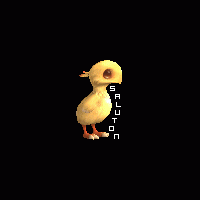Messages: 82
Language: English
pacepacapaco (User's profile) August 3, 2006, 12:05:12 AM
Well, I don't believe that Esperanto is biased toward any gender, but if anything I would argue it unfair to males. Unless, of course, we are so lazy-mouthed that the effort required to pronounce a single extra syllable is such an injustice to our tongues that we need to punish male and female equally...
Even in the usage of foreign words, there is no sexism. For example, the words (which are in alphabetical order
 ) "geonklo," "onklino," and "onklo," are probably derived from the German "Onkel"/English "uncle" which is male. The words "frauxlino," "frauxlo," and "gefrauxlo," however, seem (to me) to come from the German word "Fräulein," which is feminine (the diminutive of "Frau").
) "geonklo," "onklino," and "onklo," are probably derived from the German "Onkel"/English "uncle" which is male. The words "frauxlino," "frauxlo," and "gefrauxlo," however, seem (to me) to come from the German word "Fräulein," which is feminine (the diminutive of "Frau"). Anyway, I just see the "-in" ending as a way to make the language simpler, rather than saying either "onklo kaj tanto" or "onklo kaj onkla." Even the o/a ending would be more sexist, because without creating gender in nouns, it would separate one gender from other nouns, unless another ending would be made.
So, I do see a difference between female and male in Esperanto, but for me there is no evidence that one is somehow "better" than the other, which is exactly how I see it non-linguistically.
I'm exhausted.
Shawna (User's profile) August 4, 2006, 8:49:51 PM
I thought the whole point of Esperanto was to avoid this kind of balkanization into groups using "sexist" construction vs. "neutral" construction.
Shawna
dygituljunky (User's profile) August 9, 2006, 6:31:20 AM
Shawna:Oooh, good one about how to talk about an intersexed personAh, that's right, "intersexed." It's been 10 years my class on The Anthropology of Sexuality. I think my professor extended the three intersexes to a continuum theory, saying that there are infinite variations that fall between male and female.
-snip-
I read some writer says that there are actually three other sexes along with the he/she. They are herms (true hermaphrodites), ferms (female pseudohermaprodites- anatomically female but genetically male), and merms (male pseudohermaphrodites -anatomically male but genetically female).
Try figuring out gender references if that idea became common!
But, to get back on topic, I think that a single intersex pronoun could apply two all three (or all variations) of intersexed persons.
erinja:"sxli" is a variation that might work, and be more easily pronounced to boot! Although since it is already used in some Esperanto settings, (in a similar sense to "s/he" in English, that is, to indicate "he or she") perhaps it wouldn't be the best idea to appropriate it for something else.Huh! Great minds, and all that. I thought of suggesting "ŝli" as a viable middle gender pronoun. I didn't know it was already out there...
waxle:dygituljunky, you understood "Psych. Responses" perfectly, but misunderstood the purpose of my post! My intention was to point out that if Esperanto were perfectly gender-neutral, the people using that as a reason not to learn it would simply find some other excuse, not because the excuse is valid, but because they simply do not want to.Ah. I did COMPLETELY miss that point. And it's true, just as it's true for any other language. If someone doesn't want to learn a language, they won't.
My best friend convinced himself that he couldn't learn Spanish in high school but now he's learning Japanese with his wife! To me, Japanese is much more difficult than Spanish (but I'm trying to learn Japanese, anyway).
waxle:Switching gears: I guess I'm what you might call a fundamentalist. I simply can not see merit to the ideas of Riism. Replacing 'li' and 'ŝi' with 'ri' is overkill; we already have 'ĝi'. All 'ri' can do is seperate the language into two dialects. The same goes for '-iĉ-' when we have inferred masculinity and the prefix 'vir-'.You make several very valid points.
I am not learning Esperanto to join an international feminism movement. I am learning Esperanto to communicate effectively and fairly with my world and to expand my possibilities accordingly. These ideas are trying to promote an ethical and political truth and sacrificing linguistic concepts in the process. Esperanto is designed to be easy to learn for everyone while prohibiting the sprouting of different dialects.
Is it not possible that a male Esperantist could use '-iĉ-' and still beat his wife and prohibit her from taking a job outside the home? Can a suffix take the place of a taught value for the potential of every person?
If I want to teach my children that men and women are equal, I will treat men and women with equal respect (teaching by example) and explain to them that there is nothing that makes any one person superior or inferior to any other person. I will NOT adopt an affix that has the potential to destroy the root concept of a language that I love.
I guess my argument is really two separate issues:
- The implied masculinity of people-describer nouns.
- The greater simplicity of -iĉ-/-in- over vir-/-in-.
I like the idea of the masculiniser and the femininiser both being suffixes thus being used in the same exact way; this is marginally easier to learn than vir-/-in-. Not like that's difficult to learn. -iĉ- makes genderization more regular. Even if you prefer Dr. E's vir- over the neologistic -iĉ-, please understand that I'm not trying to do an Ido, here, I'm just in favor of the simplest possible rules. And, you're right, the prefix/suffix alone won't teach equality or prevent a man and woman from beating each other. But it's one more tool in the toolbox.
In terms of the implied masculinity and modified femininity of person-describer nouns, that's where I really want to see a change happen. Wherever the language got it's root words, the ESPERANTO noun roots could be transformed into non-gendered noun roots. I believe I read somewhere that all nouns were assumed to be masculine but the non-person nouns gradually came to be considered non-gendered; I'm just arguing that we finish the transition from gendered noun roots to non-gendered ones. In terms of this issue, I really don't care whether vir- or -iĉ- is used for the masulinization, as long as the noun roots all become non-gendered over time. This is, to me, the more important tool to have in the toolbox.
Shawna:That's the point I was trying to make, but you put it more succinctly than I could. I mean, if you come down to it, you could say that all languages are sexist. In Arabic, the word for children is derived from the word for male children. You could go on and on.But, in contrast, Esperanto is sooooo close to non-sexist, so very close. If only the few person-related root terms were thought of non-gendered. It would require adding vir- or -iĉ- to masculinize it or the addition of -in- to feminize it. Even if -iĉ- isn't adopted and we stick with vir-/-in-, my wish/hope is that the root terms be regarded as non-gendered and that masculinizing at root term be required to indicate a male person.
That'll be useful for when you truly don't know the gender of a person, either because you haven't met them or because you can't figure it out (ie Saturday Night Live's Pat).
Shawna:I thought the whole point of Esperanto was to avoid this kind of balkanization into groups using "sexist" construction vs. "neutral" construction.Yes, but a language has to also grow and change with the culture in order to remain relavent to that culture. Feminism is becoming a part of the global culture and Esperanto, deining to be nuetral, just barely misses the mark. The point of Esperanto, as I understand it, is to give everybody, everywhere, an easy, neutral language to communicate cross-culturally. It just seems that failing to adjust for the growing acceptance of gender-equality means that the language will lose some (not all) relavance for some conversations.
That's not gonna stop me from learning it or being part of the culture, I'll just be one voice among many trying to change it very slowly from the inside.
The good thing about Esperanto and the Esperanto community, is that I can go to a congress and use -iĉ- and use -iĉ- and use -iĉ- and people will eventually get used to it. And I can go and say that I am the patriĉo (or virpatro) of my child and, though it will sound redundant for the first 50 or so years, I might just be the last ant needed to push the apple and make it move.
I don't want to make another Ido. Neither am I advocating all of Riismo. I think that non-gendered noun roots and the acceptance of -iĉ- as an alternative to vir- are acheivable goals. In other words, I want the living language to change, ever so slightly, and as slowly as required, from within. More precisely, I want to see it grow from within.
(Oops, I didn't mean to make such a long post. Sorry)
erinja (User's profile) August 9, 2006, 4:33:57 PM
dygituljunky:Not all of them though, only the family relationship ones.
I guess my argument is really two separate issues:
- The implied masculinity of people-describer nouns.
dygituljunky:I think it adds an unnecessary complexity. Esperanto is a living language and it changes. However, if you changed things such that "patro" started meaning "parent", this basically invalidates 100+ years of Esperanto literature. Children would all have to learn that "patro" means "father" up until a certain date, and after that it means "parent". They would essentially have to look at the date of a text to guess at the meaning, and even then they couldn't be sure, because it would certainly depend on the author. So I don't see it as being less complex at all; it's just one more thing to learn. Not only the patro issue but the vir- versus -icx- issue. The entire Esperanto community will never make the switch, not now, and not 50 years from now. There are still plenty of people who use the -ujo suffix for countries, even though many (most?) Esperanto speakers have switched to -io. In all cases that I can think of, the changes in Esperanto grammar are not changes per se, but additions - you add a new form, but the old form is still valid, so not to invalidate an entire corpus of literature and render it "wrong".
- The greater simplicity of -iĉ-/-in- over vir-/-in-.
I like the idea of the masculiniser and the femininiser both being suffixes thus being used in the same exact way; this is marginally easier to learn than vir-/-in-. Not like that's difficult to learn. -iĉ- makes genderization more regular. Even if you prefer Dr. E's vir- over the neologistic -iĉ-, please understand that I'm not trying to do an Ido, here, I'm just in favor of the simplest possible rules. And, you're right, the prefix/suffix alone won't teach equality or prevent a man and woman from beating each other. But it's one more tool in the toolbox.
So yeah, a hundred years ago, "instruisto" would always have meant a male teacher, and today "instruisto" means either one. But I would argue that when talking about teachers it doesn't matter whether you're talking about a male or a female, but when you're talking about parents, it matters more, so that it does actually matter when talking about "patro" whether you mean a father or a parent. Because culturally, fathers and mothers are not the same, in most (all?) world cultures they do have somewhat different roles, if only due to biological differences.
This is why I'm strongly against removing the gender from these family roles - talking about "patricxoj" "avicxoj" etc. I think it would make the reading of past literature fiendishly complex. Somewhat like how the word "rather" means something like "very" in American English, but "not very" in British English. The same word, with opposite meanings. I find it counterproductive. And if Esperanto wants to bill itself as being easy to learn, I think it can do without added complexity.
dygituljunky:Bertilo Wennergren (writer of the PMEG, for those who are familiar with it: www.bertilow.com/pmeg] once told me "Our task is not to change the language, but to learn it", a sentiment I fully agree with. The point of Esperanto is not to speak in a 100% gender-neutral way; I doubt that Zamenhof had gender neutrality in mind in any way when he wrote it. The point is to use it to communicate with other people. By going through and saying "let's change this, let's change that", we are adding complexity by declaring certain grammatical points to be no longer valid and adding new things. Languages change and new things get added. But in most cases, except in cases of governments who make decisions, people don't sit down and say "let's change this, this, and this about our language" and change it. It happens more organically. I think that by removing gender from family words, it is adding much more complexity than it's taking away. It's saying "gender neutrality is more important than having a language that's easy to speak and learn" and "It's more important to be gender neutral than to be able to easily read older texts without analyzing every single use of a word like 'patro'."
In terms of the implied masculinity and modified femininity of person-describer nouns, that's where I really want to see a change happen.
And I know you said you didn't want to "pull an Ido" on the language. But honestly I am so wary of beginners who come in and say "Oh, what a great language! These are the changes I think it needs" then come up with a laundry list of changes, then start speaking some bastardized Esperanto and wonder why other people don't want to talk to them. Those people usually don't stay with Esperanto very long; they usually flit back and forth between various constructed languages because none of them are perfect. I'm not saying that you're such a person. The point I'm making is that you'll never find perfection. Most Esperanto speakers are basically happy with the way things are and not very amenable to change. And if you teach your child to speak in some weird -icx- Esperanto, s/he will probably eventually stop because no one else talks that way and people will constantly ask her/him why s/he talks funny, and s/he will get tired of being asked and eventually just talk like everyone else because it's easier that way.
As it has already been stated - gender neutrality in language has basically nothing to do with how women are treated in a society. Chinese has a single pronoun for he, she, and it. Italian is highly gendered. Do Chinese people mistreat women more than Italians? Do English speakers mistreat women less than other speakers of European languages because English is relatively more gender neutral? If these gender issues in grammar really mattered that much, then all Italian mechanics would be women since the Italian word for "machine" is feminine.
More importantly, if someone teaches a child that "we speak a language in this way because we believe in gender neutrality and treating women equally", will that child believe that speakers of more standard Esperanto do not believe in treating women equally? And if you tell the child that most speakers of standard Esperanto also believe in treating women equally, when the child asks 'so then why do we have to talk funny', what do you say?[/quote]
Maverynthia (User's profile) September 2, 2006, 8:03:56 AM
Also, the endings are the same way, if you see the -iĉ ending only relating to someone with a masculine name or things or seeing in comparison to the -in ending, the context clues will point you to thinking it was it's opposite compliment.
This doesn't invalidate the 'old ways' of speaking.
Also, for those thinking that children would change from -iĉ, it might go the other way as well.
"Oh cool, now I can say 'male instructor' (instruistiĉo) and everyon will know it's Mr. Bailey."
or
"Oh cool, now I can just refer to my teachers as 'instruisto' and others can't figure out who we are talking about."
Kids will sometimes borrow from their friends rather than make one adapt depending in the age. Such as:
"Oh cool, you say it differently and that sounds cool so I'll say it differently too!"
As for the vir- beginning, I think it makes things difficult because there is already a convention of -in making it female. Also, for some feminists they can see 'virinstruisto' and then see 'instruistino' and make the symbology out of 'male coming before female'. Which really why add vir- to the from and not in- or some other word that evokes the feminine?
T0dd (User's profile) September 4, 2006, 1:35:35 AM
Women are not oppressed by being referred to with compound words, and men are not privleged by being referred to with non-compound words. These things are a distraction from real issues of oppression and privilege.
Moreover, the demonstrative adjective "tiu" will also often serve in cases where we need a gender-indeterminate form...
erinja (User's profile) September 4, 2006, 3:37:18 PM
Maverynthia:If your over a certain age, you may remember the Flintstones having a "gay old time" if your younger you only know the modern meaning of the word. So, this happens all the time. Also, to figure out in what the word means, there are things like context clues.This adds unnecessary complexity to the language, in my opinion. And in any case the hypothetical kids would still have to learn the "old way" so they could read older literature, so what do we gain by adding complexity? Basically, if such an ending were intentionally added, it only teaches the kids "languages are sexist" rather than "people are sexist" and teaches them to think that if someone chooses not to use -icx- because they think it's silly and unnecessary (such as myself) that those people are sexist because they choose to use "sexist language".
Also, for those thinking that children would change from -iĉ, it might go the other way as well.But this is already the case. I can say "virinstruisto" to talk about a male teacher and "instruisto" to talk about a neutral teacher, and "instruistino" for a female teacher. In practical speech, the only words that are gendered anymore are the words for family members, and (for some but not all speakers) the word "friend" (which in many languages is treated grammatically as a family member sort of relationship)
"Oh cool, now I can say 'male instructor' (instruistiĉo) and everyon will know it's Mr. Bailey."
or
"Oh cool, now I can just refer to my teachers as 'instruisto' and others can't figure out who we are talking about."
As for the vir- beginning, I think it makes things difficult because there is already a convention of -in making it female. Also,So using a prefix that already exists is more difficult than making up a brand new suffix? This doesn't make sense to me. Using a word prefix that everyone knows and that is already part of the language is "more difficult" than making up a new suffix that most people are not aware of?
see 'instruistino' and make the symbology out of 'male coming before female'. Which really why add vir- to the from and not in- or some other word that evokes the feminine?Well you could say "Virininstruisto" and be understood, I'm sure. But I think it's silly to propose that putting the male indicator as a prefix and the female indicator as a suffix is sexist. Since ge- is a prefix and -in- is a suffix, does that mean that a group having both genders is inherently better than women only? Does eks- as a prefix and -eg- as a suffix mean that an "ex-something" is better than something that is big? So an "eksprezidento" is better than a "prezidentego"? Isn't that discrimination, saying that ex-presidents are better than fat presidents? Of course not, because something being a grammatical prefix is not inherently "better" than being a suffix.
mateno (User's profile) September 4, 2006, 10:47:16 PM
then, I was just lucky enough to say this sentence first in my mind, before actually saying it aloud to an "estimata samideano" and my good friend: "Kaj kiel fartas viaj nepiĉoj?"
that day all my experimenting with "-iĉo" was finished once for ever, with a negative result
if you like, read my translation of Kipling's Cat that Walked by Himself, where I use "-ino" and "vir-"; I found it does not bother me, if one is a suffix and the other is a prefix, it just adds symetry to the language
(I use "ŝli" for the Cat, because I could not decide: the Cat is "he" in the English original, and "she" in the Czech translation, which I used to listen to when I was a child)
orthohawk (User's profile) September 21, 2006, 1:26:04 AM
Le Hibou:This discussion reminds me of the time, thankfully long ago, when feminists wanted to change the English word "women" to... "womyn"."woman" comes from Old English "wiffman" or wife-man (!) HOWEVER: the "man" in this compound is 'homo' NOT 'viro'...........
I don't know if it's true or not, that the words "woman" and "women" are derived from "man" and "men", but if you think this is sexist language, then you are living in cloud-cuckoo land!
Lunombrulino (User's profile) September 21, 2006, 1:50:00 AM
Le Hibou:Wells' dictionary translates "Secretary" to "Sekretariino." I don't believe Wells was consciously sexist, but this wasn't one of his best moments. It was, however, an accurate reflection of the society that he was comfortable in.
German reformists wanted to drop the feminine suffix from words relating to professions, e.g Sekretär (male secretary) / Sekretärin (female secretary). German feminists objected, seeing it as an attack on their femininity! So, if I want to speak German well, I have to use such sexist language, it's tough, but that's just the way the language works.
Sexism is in the eye of the beholder, not the language! Leave our language alone!
I do believe that common usage is now "Sekritario," (though I just checked the Lernu vortaro, and it lists both "Sekretario" and "Sekretariino." It also translates "nurse" as both "flegisto" and "flegistino". This is as equally sexist as specifying a "male nurse" in English. Logically, there is no point in specifying the gender of the profesional unless there's some purpose to it. I think it was Gloria Alred who said, "Unless a job actually requires a penis or a vagina, it should be open to anybody." But I digress.)
The point has already been made that language is a mirror of the society that uses it, and the fact that the speakers of both Esperanto and English are struggling to make those lanuages less sexist is a good sign.








